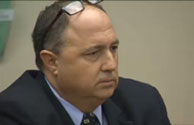Columbus Lawyer Suspended for Disclosing Information Obtained from Prospective Client

Columbus attorney Christopher T. Cicero.

Columbus attorney Christopher T. Cicero.
The law license of Columbus attorney Christopher T. Cicero has been suspended for one year for improperly disclosing to former Ohio State University football coach Jim Tressel information that Cicero obtained during consultations with a prospective client.
In a 5-2 decision announced today, the Supreme Court of Ohio adopted findings by the Board of Commissioners on Grievances and Discipline that Cicero violated two provisions of the Rules of Professional Conduct by sending emails to Tressel in which Cicero disclosed information he had received from Edward Rife, the owner of a tattoo parlor frequented by OSU football players, who consulted with Cicero about possible representation in a federal investigation of Rife’s alleged involvement in drug trafficking.
In those emails, Cicero told Tressel that a number of his players had apparently given or sold team memorabilia to Rife in exchange for tattoos, and that dozens of those items, including Big Ten championship rings and athletic jerseys and shoes autographed by the players, had been confiscated by federal authorities during a raid on Rife’s home in connection with the drug trafficking investigation.
The board concluded that, although Rife was ultimately represented by a different attorney, Stephen Palmer, and never retained Cicero’s services, Cicero violated Rule 1.18 of the Rules of Professional Conduct, which requires an attorney to maintain the confidentiality of information gained through consultation with a prospective client. The board also found that Cicero had engaged in conduct that reflected adversely on his fitness to practice law.
Writing for the court, Justice Judith Ann Lanzinger rejected Cicero’s argument that his interactions with Rife did not support a finding that Rife was a prospective client.
Justice Lanzinger wrote: “We agree with the board that relator has proved by clear and convincing evidence that Rife was a prospective client of Cicero. As the panel found, the two discussed the possibility of a client-lawyer relationship; Cicero admitted this in his e-mails to Tressel, and Rife testified as to the discussion. Rife’s testimony was corroborated by Palmer, who testified that Rife had told him soon after the meeting with Cicero that Cicero had quoted him a fee. Rife met with Cicero on April 15 to discuss his case, and Cicero offered legal advice in response to Rife’s questions.”
“While we recognize that some limitations on the rule’s protection to prospective clients may be justified, those limitations do not come into play here. Indeed, this case goes to the very heart of confidentiality between a prospective client and an attorney. Before obtaining representation, clients must meet with attorneys, and attorneys often must obtain sensitive information before they can decide whether to represent a client. Prospective clients trust that their confidences will be protected when they engage in an initial consultation with an attorney. Cicero’s almost immediate dissemination of the detailed information that Rife provided on April 15 directly violated that trust. This conduct violates Prof.Cond.R. 1.18, as well as Prof.Cond.R. 8.4(h), which prohibits a lawyer from engaging in conduct that adversely reflects on the lawyer’s fitness to practice law.”
In setting the sanction for Cicero’s misconduct, the court noted the mitigating factor that Cicero has an excellent reputation among attorneys and judges for professional integrity and competence. It also noted the aggravating factors that Cicero was previously suspended for misconduct in 1997, that his primary motive for disclosing Rife’s confidential statements to Tressel was self-aggrandizement, that the board found some of his hearing testimony to be disingenuous and not credible, that he refused to acknowledge the wrongful nature of his conduct, and that his disclosure of Rife’s involvement in the player memorabilia transactions exposed Rife and his family to criticism and harassment because of the negative impact of those events on the OSU football program.
Noting that this is the first case in which the court has addressed a violation of Prof.Cond.R. 1.18 since its adoption in 2007, Justice Lanzinger compared Cicero’s misconduct to several similar cases and determined that a one-year license suspension was commensurate with his offense and the multiple aggravating factors found by the board.
Justice Lanzinger’s opinion was joined by Chief Justice Maureen O’Connor and Justices Paul E. Pfeifer, Robert R. Cupp and Yvette McGee Brown.
Justice Evelyn Lundberg Stratton entered a dissent, joined by Justice Terrence O’Donnell, in which she agreed with the rule violations found by the majority but said she would impose a stayed six-month license suspension as the appropriate sanction.
Justice Stratton wrote that in her view “Cicero’s intentions were not for personal aggrandizement or personal gain, as found by the majority, but were to alert the coach about misconduct by his players that could affect the team. His request that such information be held confidential does not support the notion that he was trying to seek fame. That conclusion is contrary to the content of the e-mails. Therefore, I respectfully dissent.”
Please note: Opinion summaries are prepared by the Office of Public Information for the general public and news media. Opinion summaries are not prepared for every opinion, but only for noteworthy cases. Opinion summaries are not to be considered as official headnotes or syllabi of court opinions. The full text of this and other court opinions are available online.
2012-0278. Disciplinary Counsel v. Cicero, Slip Opinion No. 2012-Ohio-5457.
On Certified Report by the Board of Commissioners on Grievances and Discipline, No. 11-055. Christopher T. Cicero, Attorney Registration No. 0039882, is suspended from the practice of law in Ohio for one year.
O’Connor, C.J., and Pfeifer, Lanzinger, Cupp, and McGee Brown, JJ., concur.
Lundberg Stratton and O’Donnell, JJ., dissent.
Opinion: http://www.supremecourt.ohio.gov/rod/docs/pdf/0/2012/2012-Ohio-5457.pdf
 View oral argument video of this case.
View oral argument video of this case.
Acrobat Reader is a trademark of Adobe Systems Incorporated.


